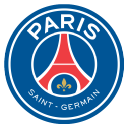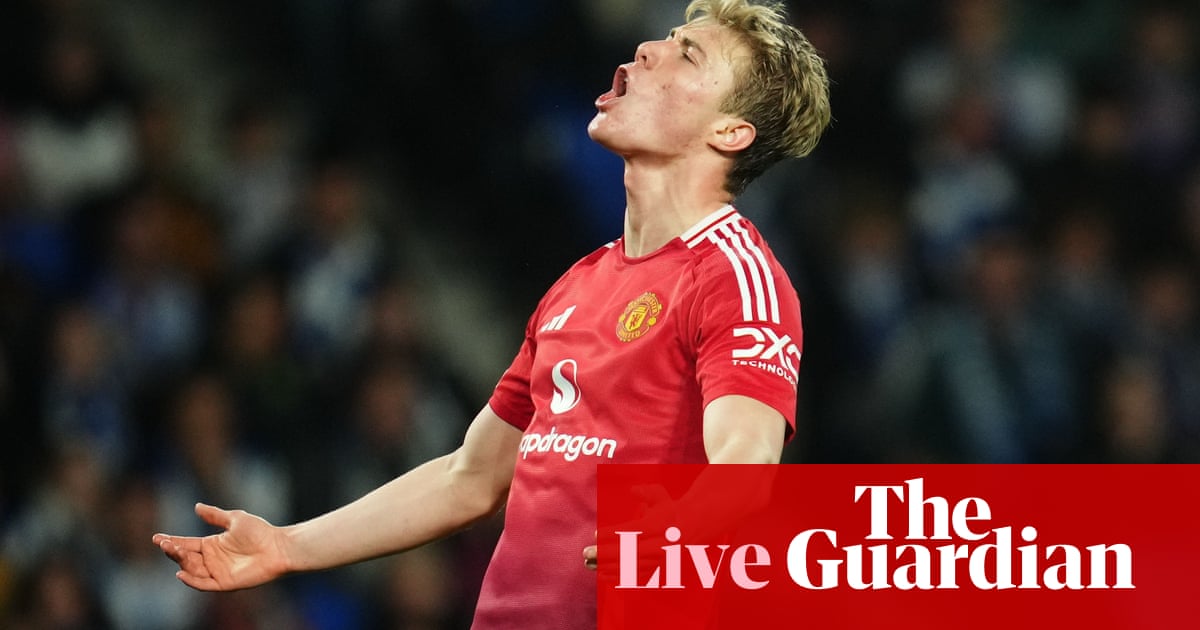Ranking all 36 Champions League teams: Can anyone stop Real Madrid or Man City?

We’ve got more teams and more games in the UEFA Champions League than ever before. The six-game, one league table group stage starts Tuesday and doesn’t end until Jan. 29.
We’ve got plenty of ground to cover and then plenty of soccer to watch, so rather than waste your time with a long preamble, let’s get down to it.
There are 36 teams in the Champions League’s revamped group stage. I have ranked the teams from 36 through 1 based on how likely I think they are to win the Champions League. How do Aston Villa compare to Juventus? Brest to Girona? Barcelona to Liverpool?
Here’s how the teams rate before the games begin.
The combined market value of the Bratislava squad, per Transfermarkt’s estimates: €24.2 million. That’s less than half the figure for any other team in the tournament — and less than what Chelsea paid to acquire a backup goalkeeper at the beginning of the summer.
Although they’re one spot below Slovan in our rankings, Dinamo Zagreb are closer to 29th than 36th. Zagreb and the next six teams after them on this list have the same title odds — an implied probability of about 0.16% each.
In years past, the best case for a team like this was a Europa League spot. But under the new model, all you have to do is finish top 24 to make it to the first knockout round.
How, uh, young are the boys, actually? The average age of the Swiss side’s squad is 24.2 — just the 12th-lowest mark in the tournament. The literal young boys: Red Bull Salzburg, at an average of 21.13 years old.
No other club better sums up the distorting effect that Champions League revenue has throughout Europe’s lower leagues. In last season’s Champions League, Red Star drew once and lost five times. In domestic play, Red Star has lost four games — over the past five seasons combined.
Keep an eye out for 18-year-old central midfielder Malick Yalcouyé, who is on loan from Brighton, perhaps the smartest club in the world. Brighton paid €7 million to acquire him from Swedish club IFK Göteborg after just 956 professional minutes. The site FBref lists him at 5-foot-5½, 128 pounds.
Quietly, Sparta Prague have been one of the more innovative teams in Europe. Their previous manager was Brian Priske, who came up through the data-driven culture at Denmark‘s FC Midtjylland and was just hired away by Feyenoord to replace new Liverpool manager Arne Slot. Sparta Prague were one of the best teams in Europe at set pieces during Priske’s tenure; will that continue under their new coach?
While they’re nowhere near as dangerous as they used to be — a combined minus-21 goal differential in the past two Champions League group stages — Celtic deserve credit for how widely they extend their scouting net. Among their 11 most valuable players on Transfermarkt, just two are Scottish while the others include three from Japan, two Americans and one each from Belgium, Canada, Honduras and Poland.
Unlike Celtic, Brugge have at least been a little frisky in the Champions League in recent seasons, reaching the round of 16 two seasons ago and putting up a respectable group stage performance two seasons before that. However, they lost leading scorer Igor Thiago to Brentford and top prospect Antonio Nusa to RB Leipzig this summer. And in previous seasons, other stars left for the likes of AC Milan, Lens, PSV Eindhoven and Bayer Leverkusen.
Do they still have the top-end talent to scare anyone this go-round?
Given the financial advantage they have over the rest of Europe, how could a team from a Big Five league be this low on the list? Behold:
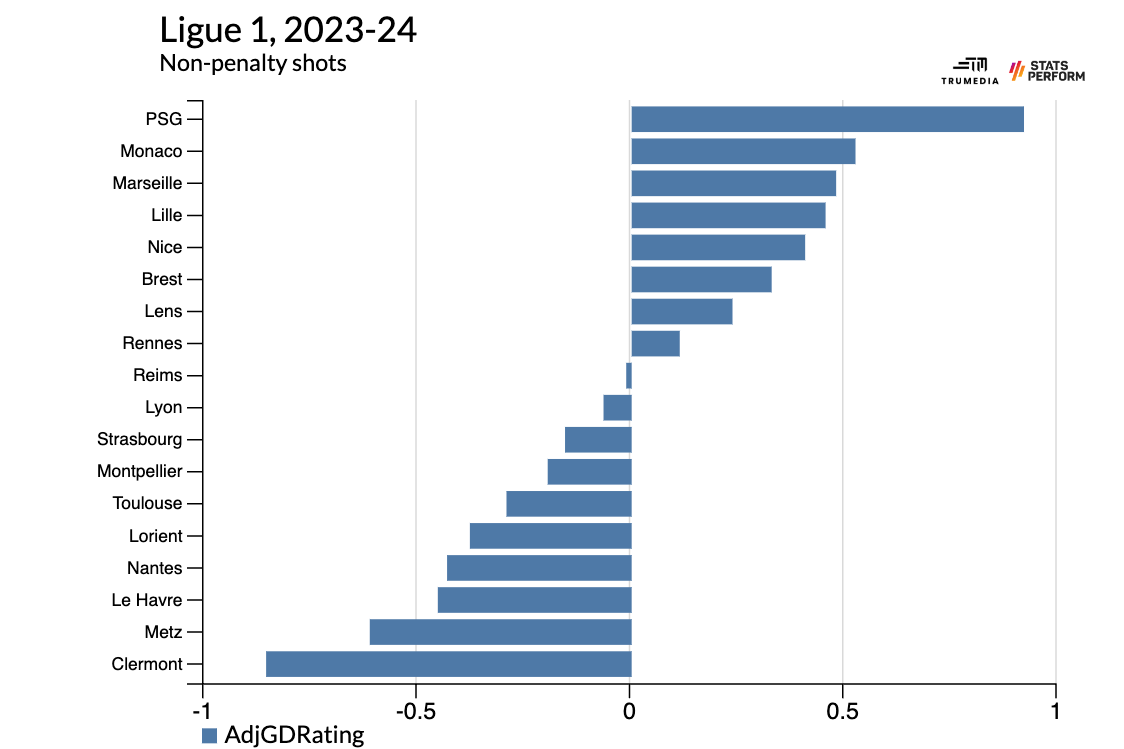
By the above metric — 70% expected goals, 30% actual goals — Brest were much closer to a Conference League team than a Champions League side.
Given that their country is literally still at war as I type, Shakhtar’s performance in the Champions League the past two seasons has been quite impressive: four wins, three draws, five losses, 18 goals scored, 22 conceded. Due to said war, Shakhtar can’t even play in their home stadium. And due to said war, the team isn’t as talented as it used to be since the roster doesn’t contain many non-Ukrainians.
The energy drink corporation’s Salzburg outpost lost the Austrian league title — to Sturm Graz — for the first time in 11 years last season. In response, it hired Pep Lijnders, Jurgen Klopp’s No. 2 at Liverpool, to his first full-time managerial gig. Uncoincidentally, it signed Bobby Clark, who featured in five Premier League games last season, and also brought in Stefan Bajcetic on loan from Anfield.
This is similar to the situation with Brest. Bologna were one of the better teams in Serie A last season, rather than a clear top-four side. In fact, they finished fifth and benefited from the tournament’s expansion to 36 teams. On top of that they lost their coach, Thiago Motta, to Juventus and their two best players, Riccardo Calafiori and Joshua Zirkzee, to Arsenal and Manchester United, respectively.
Four games into the Serie A season, they’re just one point out of … the relegation places.
The 2022-23 Eredivisie champs actually won more points last year than the season prior, but they finished second because PSV put up one of the all-time great seasons in the history of the Dutch top flight. Although I’m a big fan of Priske, Slot was a transformative manager for the club. Plus, they lost Mats Wieffer and Yankuba Minteh (ultimately) to Brighton, while Lutsharel Geertruida moved to RB Leipzig over the summer. It’s really hard to see them not taking a step back this year.
Unlike Brest and Bologna, I do think Girona were a genuine Champions League-quality team last season. They were able to hang onto their manager, Michel, but their four best players, fullback Yan Couto, midfielder Aleix García, winger Savio, and striker Artem Dovbyk all left in the offseason. If they can overcome that and still be competitive in LaLiga and in the Champions League, Michel will be able to walk into whatever job he wants next summer.
Unlike Brest, Bologna and Girona, Stuttgart played at a near-elite level last season. They finished ahead of Bayern Munich! They, too, kept their theoretically in-demand manager, Sebastian Hoeness, and they, too, lost a number of standout players to bigger clubs: center back Hiroki Ito to Bayern Munich and the pair of center back Waldemar Anton and striker Serhou Guirassy to Borussia Dortmund.
To replace them, Stuttgart spent the summer signing enough players to field multiple NBA teams. Spreading the risk — rather than trying to make a couple of big splashes — is probably best for the long-term health of the club, but not necessarily the way to raise your ceiling in the Champions League.
This team is weird.
In Angel Gomes and Jonathan David, they’ve hung onto two prospects who are now hitting their primes. And Edon Zhegrova is an intriguing wing creator who played his first full-ish season since turning pro. After that, they just have a bunch of random guys who used to play for big clubs: André Gomes, Nabil Bentaleb, Rémy Cabella, Samuel Umtiti, Mitchell Bakker, Thomas Meunier, and Kylian Mbappé‘s brother, Ethan.
After a couple of seasons in a row of transferring out some of the most expensive strikers and central midfielders in the history of the sport, Benfica’s next uber-prospect is 20-year-old center back Antonio Silva. A bunch more talent is stacked in midfield, but up top, the plan seems to be 25-year-old Vangelis Pavlidis, whom they spent €18 million on to acquire from AZ Alkmaar. Pavlidis lit up the Eredivisie last season, but the number of strikers who did that and then fizzled out elsewhere is quite long.
Can they run it back — and will it translate to European success? Unlike all of the other aforementioned clubs that had outlier-great seasons, PSV both retained their manager and all of their key players. Through five Eredivisie games this season, they’ve scored 20 goals and conceded three. Americans Malik Tillman and Richy Ledeza have both started all five matches.
[“U-S-A chant” voice] P-S-V! P-S-V!
Speaking of Americans, Folarin Balogun has picked up where he left off last season: starting about half of the Ligue 1 matches, while putting up fantastic underlying numbers that don’t lead to many goals. Last season: 8.5 non-penalty expected goals, 7 actual goals. This year:
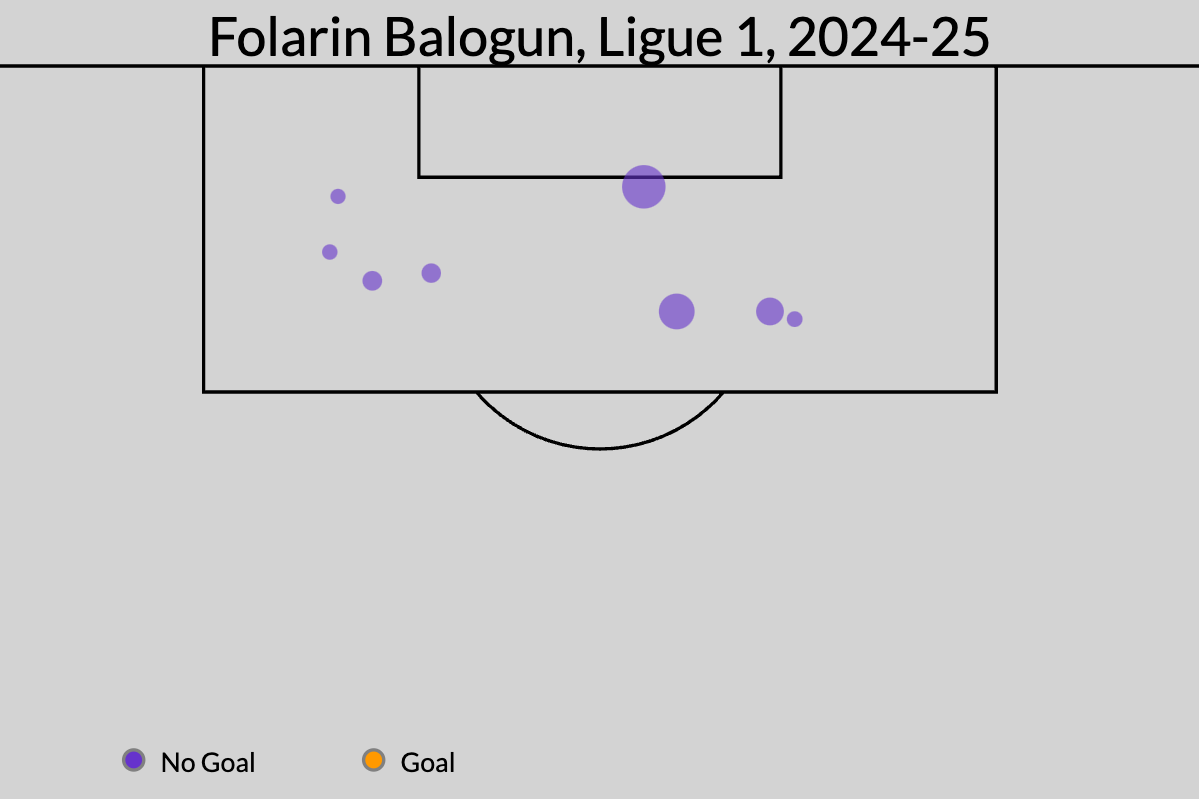
He has played in three games, taken eight shots worth 1.3 xG, and scored none.
Here’s another not-quite-elite club that had a great season last year and then hung onto their manager and all of their key players. Sporting won their second Portuguese league title in four years under Ruben Amorim, and it had been 19 years since Sporting won the league before Amorim & Co. did it for the first time. Striker Viktor Gyokere and center backs Gonçalo Inacio and Ousmane Diomande could all be gone for big money in a year, and so too could Amorim.
Among the teams outside of the Big Five leagues, Sporting are best positioned to make a dark-horse run.
This was one of the more impressive European performances you’ll ever see from an away team at Anfield:
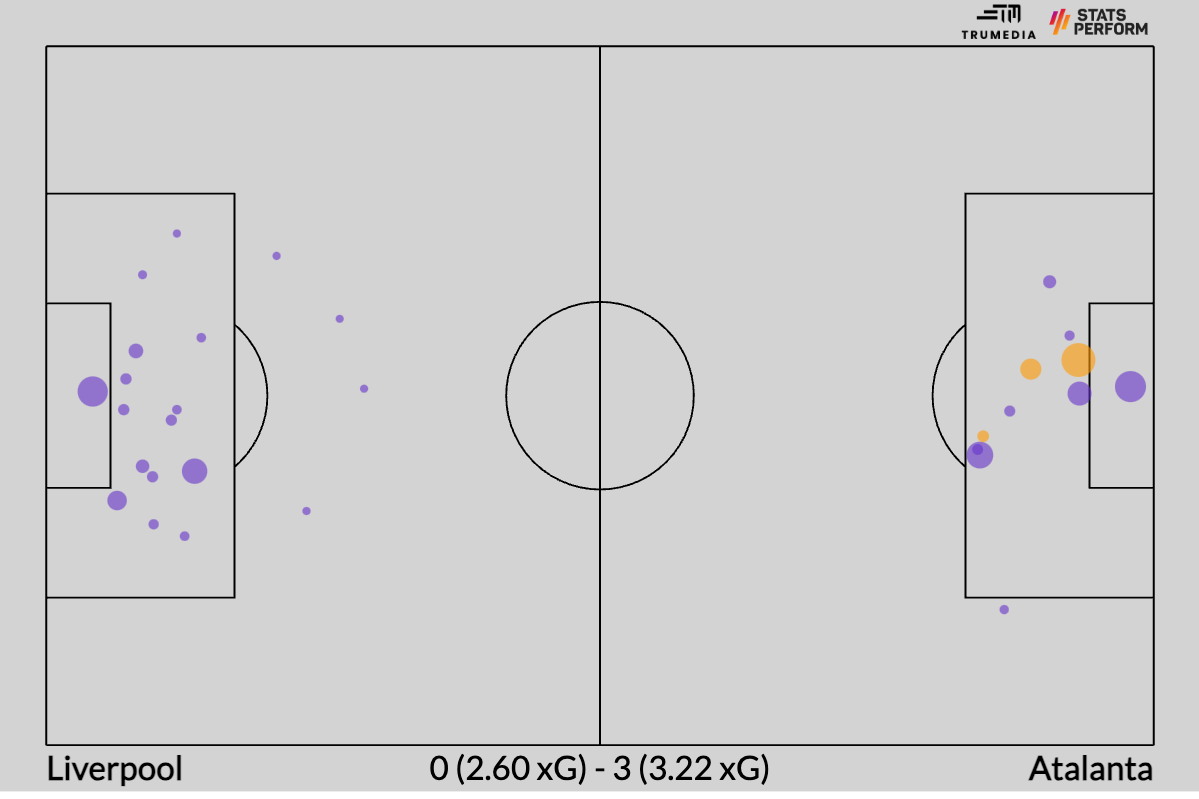
I’ve got them slated here out of respect for Gianpiero Gasperini, and because last year’s run to the Europa League title, defeating Liverpool and Leverkusen along the way, provides some proof of concept. But Atalanta have been bad to start the Serie A season. They’ve conceded more xG than they’ve created in three of their four matches, and in the other, they were down 4-0 to Inter Milan within an hour.
Although they were a Pot 1 team for the draw, I’ve got them rated as barely a Pot 2 team. They did snap Bayer Leverkusen’s year-plus unbeaten run in the Bundesliga, and they did do it on the road. But, c’mon:
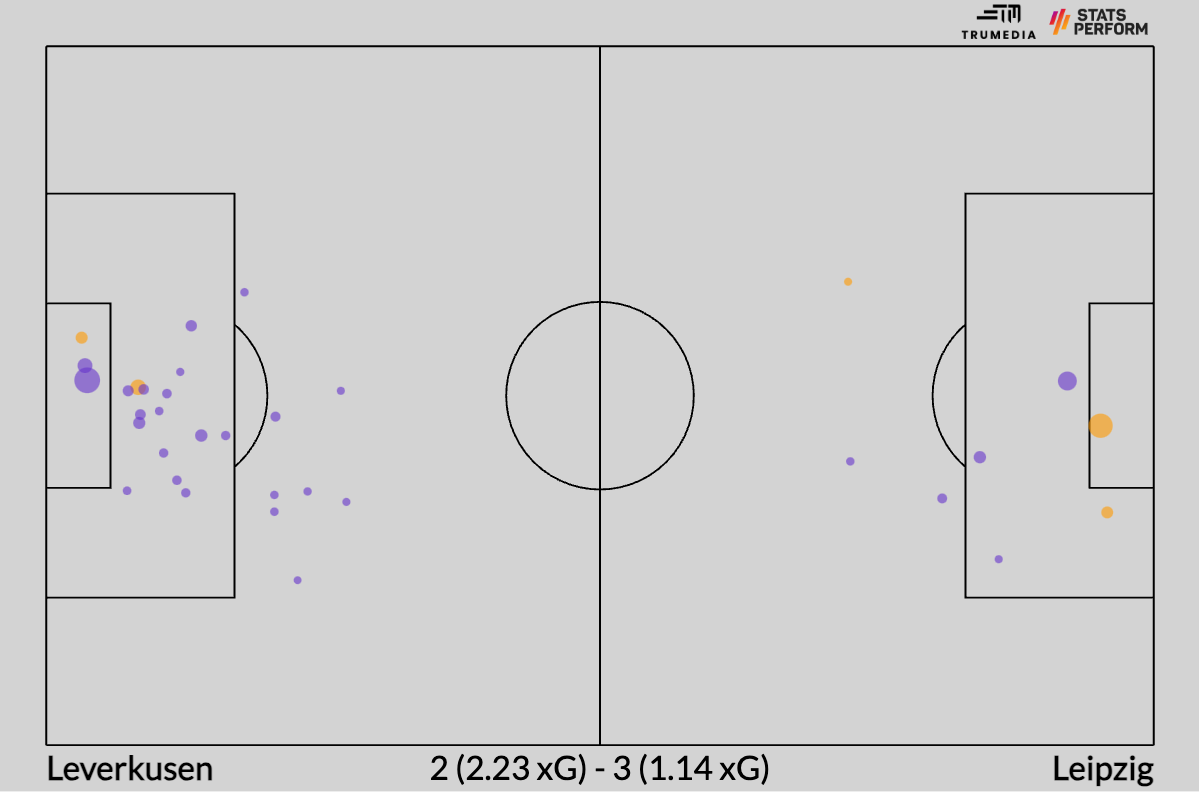
Loïs Openda might be the most underrated attacker in this tournament — he has 42 non-penalty goals and 11 assists over the past two seasons, in Ligue 1 and the Bundesliga — and Xavi Simons and Benjamin Sesko are good-to-great prospects, depending on who you’re talking to. But the talent and depth behind those three just isn’t what it once was.
Four games in, this is a two-man team. Both Christian Pulisic and Rafael Leão have been lights-out — the former averaging 0.82 non-penalty expected goals plus assists per 90 minutes, the latter even better at 0.93. So, uh, shouldn’t they be higher, both in these rankings and in the Serie A table, where they’re ninth?
The problem so far is that no one else is doing all that much in the attacking third. Outside of Pulisic and Leao, no other Milan player is even averaging 0.4 non-penalty xG+xA per 90.
Through four Premier League matches, Villa have been quite good. While they shocked everyone by finishing fourth last season, they’re currently tied with third-place Liverpool on points and have fundamentally performed like a top-four team:
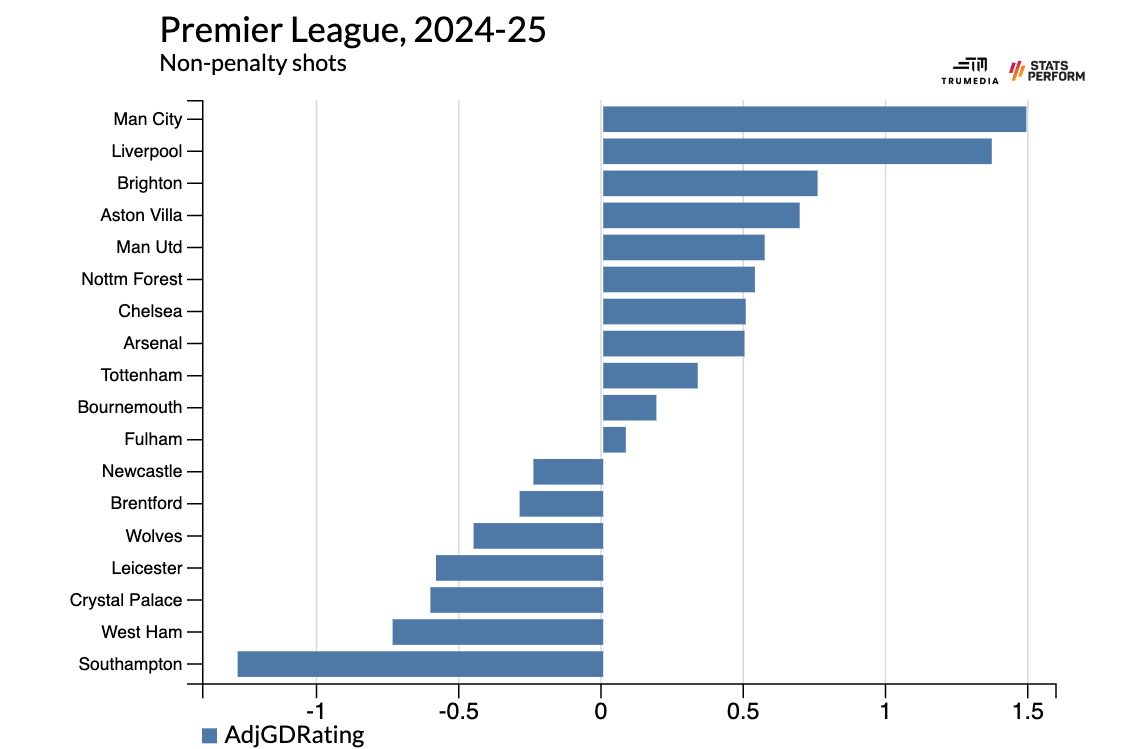
But will they be able to avoid what happened to Newcastle last season? Eddie Howe’s side came out flying last season but then gradually collapsed as the added grind of the Champions League took its toll. The big difference — outside of the whole “not being owned by a sovereign wealth fund” thing — is that Unai Emery has a ton of experience managing a European and domestic campaign at the same time. Plus, despite landing in Pot 4, Villa nabbed a very manageable schedule. They only play two teams ahead of them in these rankings — and both of those matches will be at Villa Park.
While Thiago Motta was supposedly going to usher in a new era of highly technical, advanced possession play, the end result (so far, anyway) has been exactly what you’d expect from Juventus: a team that struggles to score goals but is even harder to score against. Compared to last season, they’ve increased their possession share by 10% — up to 58% — but they’re attempting significantly fewer shots, down to 10.8 from 14.0 per 90 minutes. They’re also near the bottom of Serie A for xG created per match, but they’ve been, by far, the stingiest defensive team in not only Serie A, but all of Europe this season:
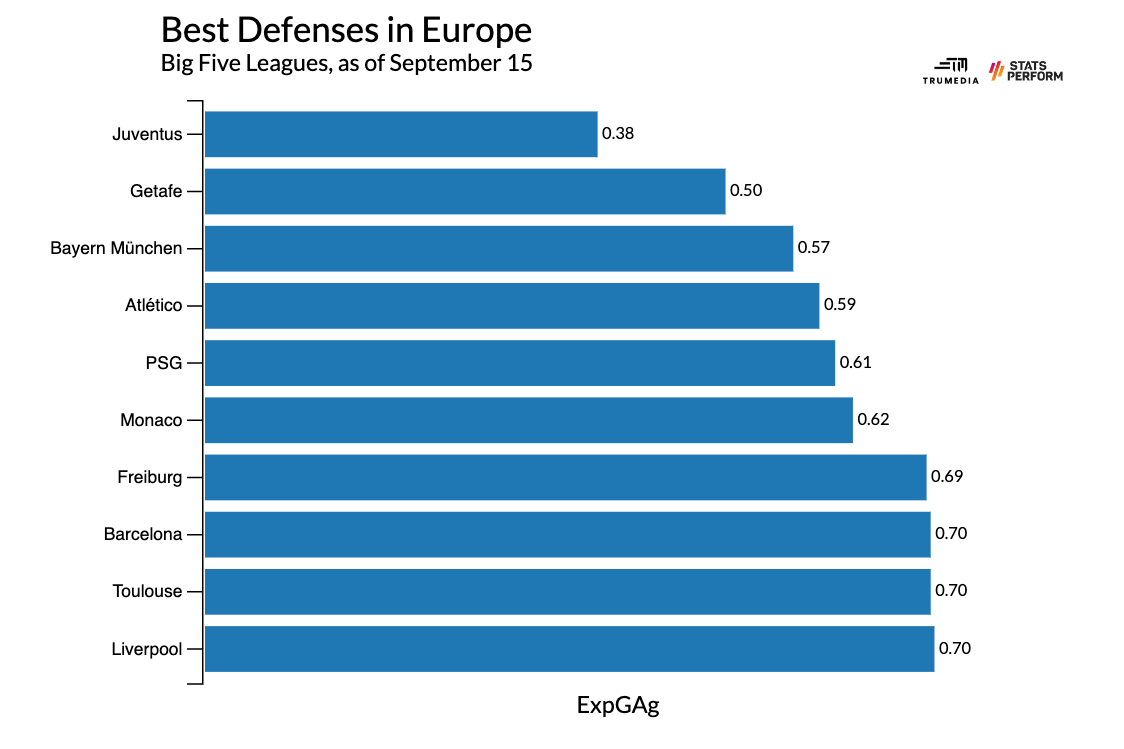
If you have no rooting interest in these matches and you like to practice self-care whenever possible, I’d recommend avoiding Juventus matches at all costs.
Is this team any better than last year? Four of the players who started the Champions League final against Real Madrid are gone. They easily could’ve won that match — and perhaps should have won that match — but they were only there in the first place thanks to a a cushy draw that pitted all four tournament favorites together on the same side of the bracket.
Away days at the Westfalenstadion still provide a massive test, but an exit before the quarterfinals feels more likely than a repeat of what happened last year.
Don’t look now, but Atletico might be back? See this chart:
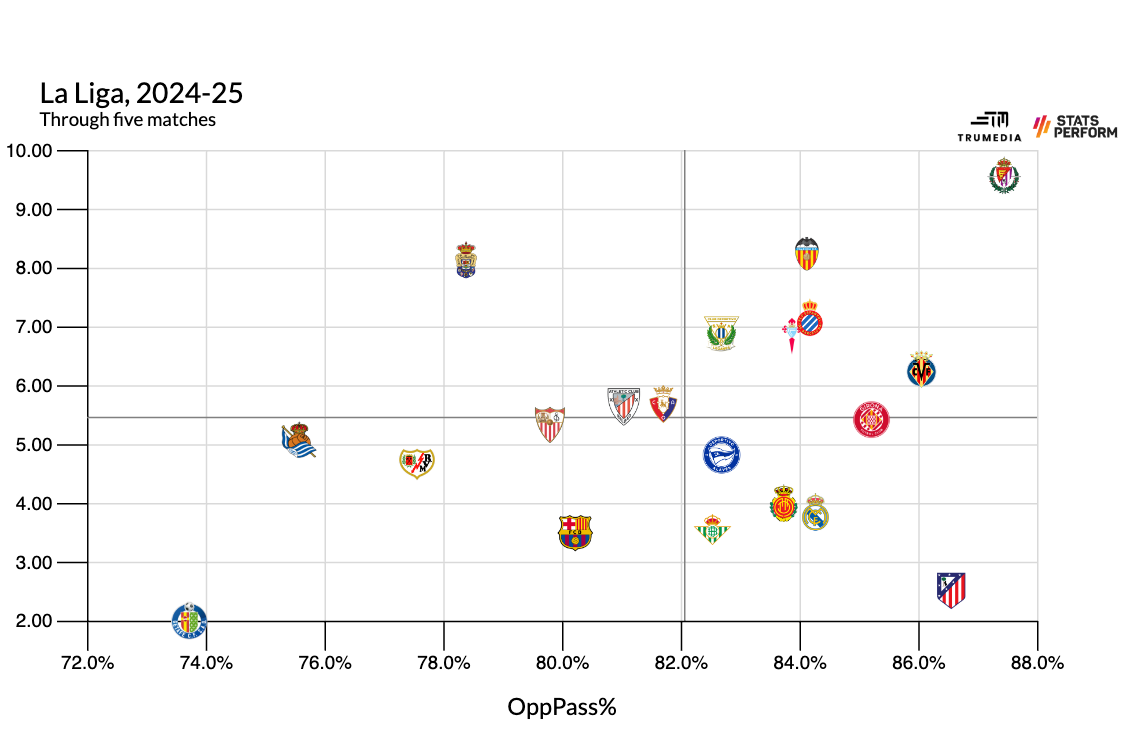
This plots expected goals conceded against opposition pass-completion percentage. While Diego Simeone & Co. lost their way a bit after winning the league for a second time in 2021, they’re once again quite easy to pass the ball against and nearly impossible to score against. But they’re also second in La Liga in xG created — behind just Barcelona. All four of their major summer signings — Alexander Sorloth, Julián Álvarez, Conor Gallagher, and Robin Le Normand — have played significant minutes already, too.
After reaching two finals and one semis in four years, Atletico haven’t been past the quarters since 2017. Could this be the year they do it again?
Six points from their first three matches certainly feels disappointing when you spent the whole previous season, you know, not losing a single match, but Leverkusen have performed at pretty much the same level they were at last season through three matches.
However, everyone else in our top 10 has a multiseason-to-half-decade track record of high-level performance. But Leverkusen have only done it one time — and never in the Champions League. They could struggle here and go home before the quarterfinals. At the same time, they kept their manager and all of their key players. They could make a deep run and go toe-to-toe with the likes of Liverpool and Inter Milan in the group stage. Neither outcome would really surprise me.
Four words to describe this team: really good, really old.
Last season, Inter won 94 points and posted freakishly good underlying numbers. I was really looking forward to seeing how they’d match up with a Manchester City or a Real Madrid, and it seemed like they were cruising halfway through the second leg of the round of 16 tie against Atletico Madrid. But then they just totally lost control of the match, blew the lead, and went home before the quarters.
Also last season: Inter’s average age, weighted by minutes played, was 29.1 — the fourth-oldest across the Big Five leagues. So they spent this past offseason turning over the squad and bringing in some younger players, right? Right?
Through four games this year, their average age has crept over 30.
While I’m constantly writing about how managers and coaches have less of an effect on results than we think, that’s over the aggregate. There are some guys who make their teams better and others who make their teams worse, and well, I’m not sure that Bayern didn’t hire one of the dudes in the second category. Vincent Kompany’s Burnley came into the Premier League with a relatively expensive squad and expectations of finishing well above the relegation zone. Instead, they tried to play an incredibly slow possession style against teams that had more talent than them — and they were awful. They made no adjustments, and then continued to be awful.
Bayern have enough talent to overcome mediocre managing to win the whole thing, but not enough to earn them a spot ahead of anyone else on this list.
Kylian Mbappe, in case you haven’t heard, plays for Real Madrid now. Gonçalo Ramos hurt his ankle and is out until at least mid-November. Randal Kolo Muani has never scored more than 13 non-penalty goals in a season. Ousmane Dembélé and Bradley Barcola each have four goals so far in Ligue 1, but I wouldn’t trust either one suddenly turning into a goal-scoring wide forward.
There’s a big goal-scoring hole, but everything looks great outside of that. Luis Enrique is one of the best managers in the world, and PSG are stocked with young, athletic and technical talent pretty much everywhere else on the field.
On Saturday, we saw the downside of Slot’s new, more controlled approach: a ton of possession, no great chances from either side, and a match that gets decided by one great individual moment. But although it felt bad — really bad, I mean, they lost at home to Nottingham Forest! — it was a game that was still more likely to end in a Liverpool win than a Liverpool loss.
Overall, the first four games still look fantastic and Liverpool’s defense remains rock solid in a way we never really saw under Jurgen Klopp. The biggest concern: Can they chase games? Under Klopp, Liverpool were pretty much the best team in the world when it came to ratcheting up pressure after they went behind. In the Champions League, you never win it all by always scoring first and then controlling your way to victory. You’re going to go behind and you’re going to have to figure out a way to break down a team that’s suddenly playing more defenders behind the ball. Against Forest, Liverpool barely created anything after they went behind.
These players certainly know how to increase the chaos to come back to win; Slot would do well to tap into that tendency however he can.
I don’t want to go overboard, but, uh …
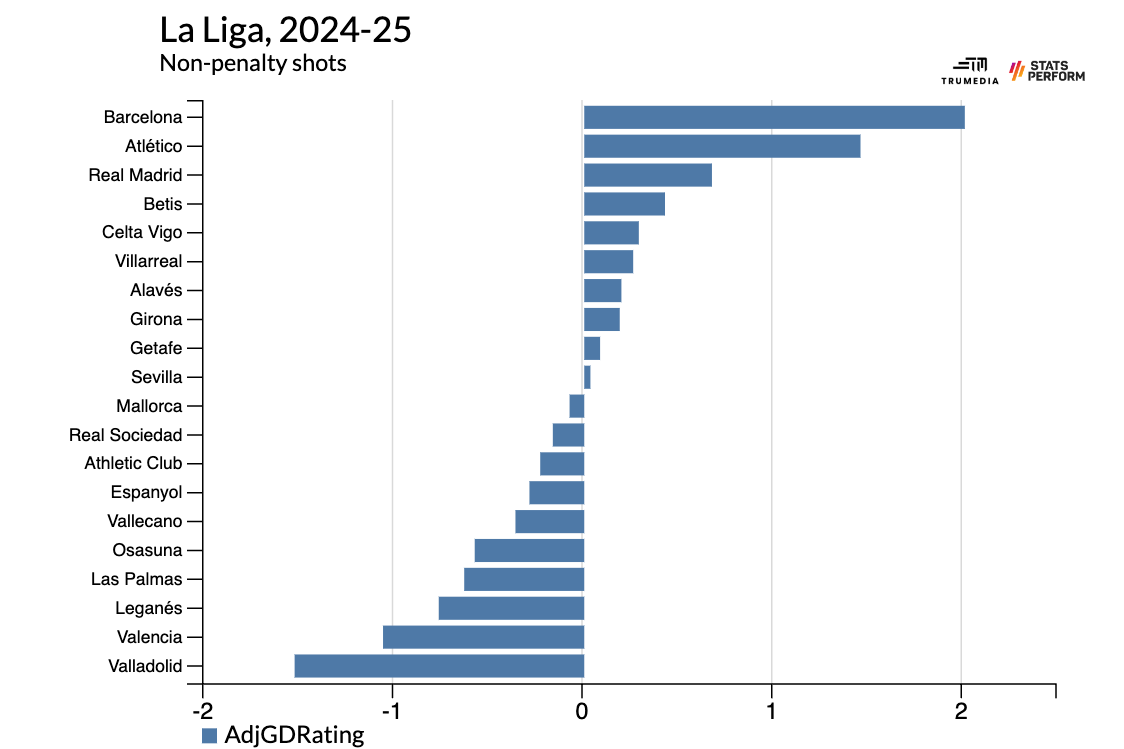
Barcelona have nearly already lapped the field in goal difference, and they’ve built up a four-point lead on Real Madrid and Atlético Madrid. They’ve also done all of this without Gavi, Frenkie de Jong and Ronald Araújo. Of course, they’ve also done it with Pedri and Dani Olmo, two of the more injury-prone players in this tournament. And their best player is 17 years old; yes, Lamine Yamal has been even better in La Liga than he was at the Euros. Through four matches, he’s nearly doubling his xG+xA rate (from 0.47 to 0.86 per 90) from last season.
There are a bunch of ways this could still go wrong, but new manager Hansi Flick has this team feeling like it finally makes sense. The high-end level we’ve seen so far this season is good enough to win a bunch of trophies.
The early-season injuries and the less-than-lights-out start in the league are a little concerning, but Arsenal have been so good over the past two years and pretty much all of their best players are just entering their primes. If we just look at domestic league performance and control for the difficulty of the league, then Arsenal have been the third-best team in the world over the past two seasons. And so, here they are: third in our rankings.
But! There’s a little bit of “OK, prove it” here. Last year, the Gunners nabbed an easy group, then an easy draw with FC Porto in the round of 16. The best teams in the world win that matchup easily; Arsenal squeaked by on PKs. Then, against a down-year Bayern in the quarters, they got outplayed in both legs, most notably generating almost no threat after going down on aggregate in the second leg. Couple that with a poor performance against Sporting Lisbon in the round of 16 in the Europa League the year before, and we just haven’t seen Arsenal beat an elite team outside of England.
So, circle Oct. 1 on your calendars as a genuine look at their progress: that’s when PSG come to the Emirates.
Now, they haven’t been bad, and 11 points from five games is a fine return. Their expected-goal and actual-goal differentials are pretty good, too, but “pretty good” is not the point of Real Madrid. And it’s certainly not the point of Real Madrid when they sign arguably the best player in the world right after winning LaLiga and the Champions League.
I’m not buying “Jude Bellingham is injured” as an excuse here. You don’t get to add Mbappe to your team and then blame injuries. More than half of Madrid’s goals (four of seven) have come from the penalty spot this far. The attack just hasn’t looked cohesive at all since Vini and Mbappe both like to drift into the same wide-left spaces, and this personnel will just never be able to press at a high level, so there are always going to be periods against whoever they play where defenders will have to make plays.
The reason they’re number two is that this team has Vinícius Júnior, Kylian Mbappe, Rodrygo, Jude Bellingham, Federico Valverde, Aurelien Tchouaméni and Eduardo Camavinga. And they’re managed by Carlo Ancelotti.
Ultimately, they’ll figure it out once the weather starts to warm up again in 2025. It’s just what they do.
They’ve been even better than I expected to start the season. Erling Haaland is on pace to score 85 Premier League goals. He won’t get there (will he?), but I genuinely would not rule out a 50-goal domestic season from him at some point.
And so, this analysis ends as it always does: Manchester City are the favorites to win the Champions League, but the most likely outcome is that someone other than Manchester City wins the Champions League.
Related
Barcelona and Bayern Munich ‘offered the chance to sign Neymar…
Neymar made an emotional return to his boyhood club Santos last monthThe 33-year-old has been linked with a European football comeback next term L
European reaction, Premier League team news and more: football –…
Key eventsShow key events onlyPlease turn on JavaScript to use this featureSouthampton: With the teams separated by 52 points, Southampton face a daunting weeke
Ineos plan for Manchester United is putting them at odds…
Sir Jim Ratcliffe is making another round of redundancies at Manchester United but the sharp drop in staff is at odds with European rivals who are adding to the
